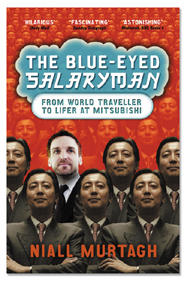Going Native? Think Again
Review of The Blue-Eyed Salaryman by Niall Murtagh
By Mariko Kato
Niall Murtagh spent the first decade of his adult life back-packing across the world. He traveled from his home country, Ireland, to Istanbul, through Patagonia to the Caribbean islands and, in 1986, to Japan. One day he found himself being interviewed with Mitsubishi. Before too long, much to his own surprise, he was settling down as a ‘lifer’ at one of the biggest and most conservative of Japanese companies. He had achieved the ultimate Japanese dream: a permanent job at a large company, a Japanese wife and a happy home.
There have been many books written about Japan and the Japanese, some ignorant and superficial, some informed but exaggerated, some informed and quite accurate but rather cruel. Murtagh’s book, The Blue-Eyed Salaryman, is a rare treat not only for its gently woven and simply told account of the unique and ever-stereotyped Japanese corporate culture, but for the author’s warmth towards his colleagues as individuals. He underlines the many hilarious anecdotes with a gentle bemusement, if not quite an affection, for corporate life. Murtagh writes from the perspective of someone who for the most part wants to become reconciled with corporate culture and, above all, has a talent for not taking either himself or the corporation too seriously. His humor is subtle, and the narrative flows seamlessly among dialogue, action and thoughts. ‘Foreign’ readers working in corporate Japan will laugh out loud or sigh with acute recognition at the all-too familiar descriptions. From robotic morning exercises to extravagant ceremonies during meetings, Murtagh recalls both the harmlessly bizarre and the frustratingly petty with the same wry smile.
However, Murtagh’s feelings on life as a foreigner established permanently in Japan are anything but frivolous. Now, having quit Mitsubishi, Murtagh speaks with sincerity and passion about the difficulty of being ‘native’ but with a foreign face. “I would agree with Terrie Lloyd—that a year or three in a Japanese company is OK, in terms of career; and if you have a high tolerance level, it is culturally interesting to stay on, if often frustrating at the same time.” However, shifting from ‘visitor’ status to that of a ‘local’ can be dis-advantageous. In the epilogue in the paperback edition, Murtagh speaks of how, “after being upgraded from visitor to one-of-the-boys status, my place in the local hierarchy was low.” The crux of the difficulty is competency in language which, Murtagh claims, is a double-edged sword. “People are no longer sure whether you should be treated as a local or a foreigner. As a ‘native,’ you can no longer pick your audience; you are regarded with suspicion and are judged harshly.” Apart from anything else, Murtagh smiles ironically about the necessity of turning up to meetings because you can no longer ‘pretend not to understand’.
 ISBN 1-86197-789-1
ISBN 1-86197-789-1
Murtagh also feels strongly about the unfair treatment of foreigners in a ‘conservative’ Japanese corporate company. The opportunity to be transferred overseas can be given to other, less competent, Japanese employees, because the company may think that ‘foreigners usually quit’, or that ‘eyebrows would be raised’ if a foreigner were promoted over a native. “Companies are struggling to be dynamic,” says Murtagh, “but the system fails because if an employee were that dynamic he would already have established himself outside the company.” Even if an employee were to suggest an idea, it takes too long for it to be proposed and stamped, and it is frustrating to always wait for somebody higher to make the final decision. Murtagh writes in his epilogue: “The fundamental problem is that the managers making the decisions have no experience of anything other than the company they work for. They don’t even realise their decision-making leaves much to be desired.”
However, in The Blue-Eyed Salaryman, despite writing about his experience in one of the most traditional of Japanese corporate companies, Murtagh focuses on his desire to be ‘a little mischievous against the “military” and the “chil-dish”. He confessed “I could have been more critical”, but this book is ultimately a light-hearted, if thought-provoking, reminiscence by a ‘native’ foreigner. It will warm the hearts not only of other ‘gaijin’ corporate workers in Japan, but of all other foreigners for whom ‘going native’, whether linguis-tically or culturally, has always been something of a bemusing double-edged sword. JI





